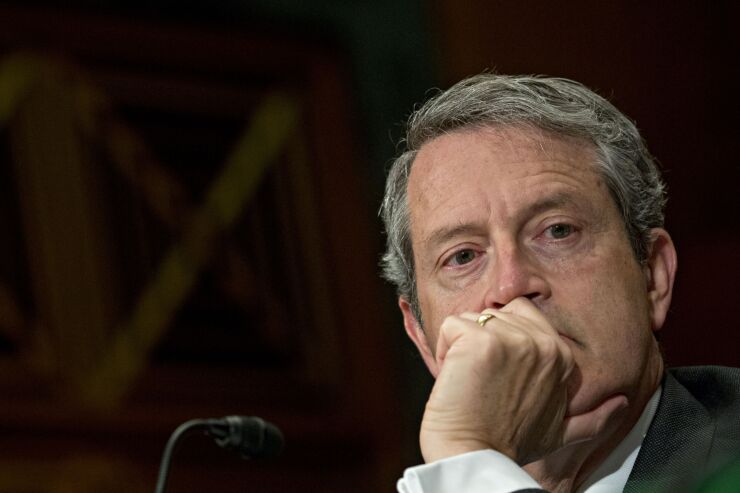Federal Reserve Vice Chairman for Supervision Randal Quarles will be removed from his role as the main watchdog of Wall Street lenders after his title officially expires this week.
The industry widely expected Quarles to effectively remain head of the central bank’s supervisory committee, even without the vice chairman title. But the board has instead decided not to have a single governor take that position, according to a statement.
Though progressive groups and Democratic lawmakers may have preferred seeing Governor Lael Brainard take over the post, they get to watch their least-favorite governor get sidelined. Quarles, who has a seat on the Fed’s board of governors, will now share oversight responsibilities with Brainard, the board’s lone Democrat who has more seniority at the Fed, and Governor Michelle Bowman.

“In light of the expiration of the vice chair’s term, he will no longer chair the committee on supervision and regulation,” the Fed said. The committee will meet “on an unchaired basis,” and only matters that all members can agree to will be forwarded to the full board, according to the statement that was released in anticipation of the questions likely to be raised on Wednesday when Quarles’s four-year term expires.
President Biden has not yet nominated a candidate for vice chairman for supervision, which would also be subject to Senate confirmation. Delaying naming Quarles’ replacement has not only meant Democrats have largely been unable to realize their agenda for Wall Street banks but they’ve also faced an industry-friendly holdout. The Fed’s bank-supervision chief is the regulator with the longest reach into the biggest U.S. lenders.
The decision on the vice chair is also entangled with Biden’s decision about whether to nominate Jerome Powell for a second term as chairman, and the Democrats who are scrutinizing Powell may approve of the removal of Quarles’ chairmanship. The president’s advisers are considering a recommendation that the president renominate Powell and appoint Brainard as the top regulator, Bloomberg has previously reported.
Quarles hasn’t said how long he will remain at the Fed as governor, but he’s expected to serve into December. Republican friends close to Quarles have asked him to stay into 2022, people familiar with the discussions have said, but he hasn’t committed to anything beyond the end of this year.
The presence of Quarles, a Trump appointee who has drawn ire from progressives like Senator Elizabeth Warren for easing Wall Street rules, has posed a challenge for Biden. Powell — also facing pressure from Democrats around recent trading scandals involving Fed officials — has taken heat as a staunch ally of Quarles.
However, Powell said recently that he would continue to let the next vice chairman take the lead on regulatory issues, even if that successor is more suspicious of the finance industry.
Quarles has indicated he’ll complete his term as head of the international Financial Stability Board, which ends in December, also enabling him to attend the Fed’s monetary-policy meeting.
Much of Quarles’s time during the past two years was occupied by the emergency measures the Fed took to cushion the blow of COVID-19 on the economy, including by loosening some regulatory constraints on Wall Street. During this period, he’s often beamed into digital conferences from the expansive library of his Utah home, where he’s spent much of the pandemic.
Though his FSB released recommendations on how to overhaul money market funds this week, other priorities — including his work on finishing an important set of capital controls already agreed to internationally —
remain undone. For now, those efforts will be lead by consensus, and taken over by his eventual vice chairman successor.
“Really important technical issues are on hold because anything that the Fed touches right now will be characterized as liberalizing big bank capital rules,” said Karen Petrou, a managing partner at the Washington research firm Federal Financial Analytics.
Fed observers expect the Biden administration to package multiple nominees to remake the central bank’s leadership. So far, Powell is widely considered the favorite to keep his chairmanship.
The supervision job is of “paramount importance,” said Satish Kini, a partner who runs the banking group at Debevoise & Plimpton. Quarles’s successor “will set the tone and agenda for the Federal Reserve on bank regulation, systemic risk and other issues,” and installing a progressive candidate could mean tough new positions on bank mergers, cryptocurrencies and the regulation of financial-technology firms.





